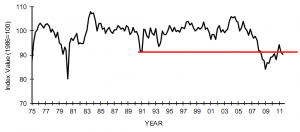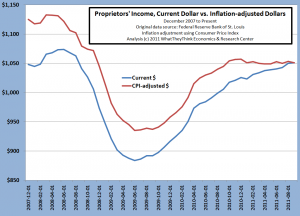Random Thoughts About the Economy, Small Business, the USPS, and Generational Extremes of iPad Use, and Other Matters
Soon, Congress' Deficit Supercommittee will report about how they will attack the deficit and the nation's debt. What they do and what they say will probably be shrugged off as the only thing they can do is kick the same old can down the road, again. They'll tell us they used new shoes to do it this time, and in a spirit of bipartisanship they tied each others laces. Everyone knows that the real Deficit Supercommittee is the 2012 presidential and congressional election, and not what this committee recommends.
When the debt ceiling crisis came to a head this summer, and S&P downgraded U.S. debt, there was great panic about what would happen. Treasurys actually went up in value after the downgrade, and it turned out that nothing really happened. One of the reasons is that Europe got worse, which made the U.S. look comparatively better. If you held U.S. downgraded debt, you made money.
The crisis-thinking of this past summer doesn't seem to matter any more in the minds of the markets and the pundits as they focus on the elections as the cure for what ails us, no matter which direction those elections go.
* * *
The USPS is looking for another rate increase,an emergency increase,
beyond the inflation rate. This is, of course, the wrong inflation rate that they are comparing themselves against. They should be looking at the -7.5% average annual decrease in computer costs, and the average -3.5% annual decrease in communications costs. All this does is widen the gap between traditional media and digital media. What other businesses can use the weight of law to impose price increases on customers? All of this is coming at a time when the competition to the USPS from other media is actually intensifying.
At Graph Expo, there was a high-level speaker from the postal service. There is nothing more depressing than to hear someone represent a bureaucracy (with a straight face) who believes that some commission report about the future will be accurate long enough for them to follow. Those future reports do not take into account the daily effects of self-destructive management actions will make their situation worse than they forecast, and the hole they have to climb out of, even deeper.
I still think that USPS should go public, and the various postal unions and their pension plans should be required to buy 50% of the business, and then take it from there, and that the only 401K options for management and workers should be USPS stock and debt. Not likely.
* * *
I'm often asked what would turn the economy around quickly. Several things would need to occur almost in lockstep. Briefly, an end to baseline budgeting for the government, a freeze on Federal spending at 2008 current dollar levels, a cut in Federal income tax rates by 10 percentage points for each tier, all coordinated with the Fed as they increase their interest rates to at least 3%. Don't hold your breath. We're in for another six or eight years of this stuff if things just loosely follow historical precedent, and it might last longer than that.
Don't think that a repeal of Obamacare will do it either. The big question if that process happens will be what will replace it, so replacing it would be extremely contentious, and might result in a solution that is more like moving around deck chairs than anything else.
* * *
A couple of weeks ago, a
YouTube video of a baby trying to use iPad finger commands on a magazine was all the rage. The title of the video is something like “baby thinks a magazine is a broken iPad.” It's a great video in and of itself, but it should also make us ask what media this baby will grow up with, and what communications options that adult will have in the workforce, sometime in 2033.
Before that, more than a year ago, a
YouTube video was posted of a 99-year old woman using a iPad for the first time. That, too, should be a reminder that any comfort we had in information users retaining their life-long media habits and providing a bottom to the hard-copy marketplace should be well out of our minds by now. We are living in amazing times.
* * *
For those executives interested international business, two free resources are worth downloading. The World Bank recently released a
free report called Doing Business. It “ranks the economies in 10 areas of business regulation, such as starting a business, resolving insolvency and trading across borders.”
One of my other favorites is the
Index of Economic Freedom as published by the Heritage Foundation and the
Wall Street Journal. The 2011 edition is still available for
free download, but keep an eye out for the 2012 edition which will probably be out by the end of the year.
* * *
What work skills will be needed in the future? A
free report about that is available from the Apollo Research Institute. There are 10 skills highlighted in the project:
- Sense-making: ability to determine the deeper meaning or significance of what is being expressed
- Social intelligence: ability to connect to others in a deep and direct way, to sense and stimulate reactions and desired interactions
- Novel and adaptive thinking: proficiency at thinking and coming up with solutions and responses beyond that which is rote or rule-based
- Cross-cultural competency: ability to operate in different cultural settings
- Computational thinking: ability to translate vast amounts of data into abstract concepts and to understand data-based reasoning
- New media literacy: ability to critically assess and develop content that uses new media forms, and to leverage these media for persuasive communication
- Transdisciplinarity: literacy in and ability to understand concepts across multiple disciplines
- Design mindset: ability to represent and develop tasks and work processes for desired outcomes
- Cognitive load management: ability to discriminate and filter information for importance, and to understand how to maximize cognitive functioning using a variety of tools and techniques
- Virtual collaboration: ability to work productively, drive engagement, and demonstrate presence as a member of a virtual team
* * *
While the stock market loves mergers and acquisitions because the euphoria they create drives up stock prices, I've never been a real fan. Neither is investment manager David Herro, which he stated
in an interview on Bloomberg Radio, calling M&A a “destroyer of company value.” His words are different than mine, but most companies and stockholders underestimate the transition risk that is created. While companies often save money from combined operations, they attention is taken away from the marketplace and focused internally. It's usually a great time for competitors to take advantage of that diverted attention and the disruptions in workforces.
* * *
China's currency policies are in the political news again, as it is claimed they are manipulating exchange rates. For years and years, China pegged the yuan to the U.S. dollar. This meant that we were actually in charge of their monetary policy. So as the U.S. entered in a decade-long policy of weakening the dollar, which is currency manipulation in and of itself, China rode along with us.
It's not like that getting China off is currency policies would do anything anyway. Half of the contents of goods manufactured by China come from other countries. This is why non-China, non-Japan Asia has been such a hotbed of investment for many years, as companies in numerous countries in that region sell materials, commodities, and goods to China.
Those dollars that China has in its reserves have to be repatriated to the U.S. to ultimately have value. Or, they can be used in trades that involve dollars, such as buying oil and other commodities that are usually paid for in dollars because the U.S. dollar is a reserve currency.
It still seems so disingenuous for the country that brought the world collatoralized debt securities, quantitative easing (QE2), and made “the twist” part of the monetary policy vernacular to claim that another country is “manipulating” its currency. Countries do it all the time, unfortunately, and now we have the entire Eurozone doing it, too! Of course, it's all for the good of the countries and their citizens, like Greece and Italy, with more to come.
One day, China may decide to join the Swiss and peg their currency to gold. Then what would the politicos say?
* * *
It's generally believed that small business is a great engine of economic growth. Small business' role in hiring is overstated (they hire often but they also fire more often). With more than half of U.S. employment in small businesses (defined as any business with less than 500 employees, believe it or not!), any economic recovery that lacks small business participation is virtually impossible.
The
latest survey of the National Federation of Independent Business had encouraging increases in many of the factors it covers, but not enough to pull its optimism index out of the doldrums. The chart below (click to enlarge) shows the NFIB index. I have drawn a line from the bottom of the recession around the time of Bush41 across to our current woes, and it's clear to see that the small business sector still has far to climb to even get to those low levels.

In the reports of personal income and Gross Domestic Product (GDP), there is an obscure data series that relates to small business called “proprietors' income.” The chart below (click to enlarge) shows the unadjusted current dollar data as a blue line, in an uptrend since the bottom of the recession in mid-2009, and now slightly ahead of where it started at the beginning of the recession in December 2007. The inflation-adjusted data reveals the true trend of small business: sideways. This data series is still well below where it was at the start of the recession, and is lower than it was at the end of 2010.

# # #
 In the reports of personal income and Gross Domestic Product (GDP), there is an obscure data series that relates to small business called “proprietors' income.” The chart below (click to enlarge) shows the unadjusted current dollar data as a blue line, in an uptrend since the bottom of the recession in mid-2009, and now slightly ahead of where it started at the beginning of the recession in December 2007. The inflation-adjusted data reveals the true trend of small business: sideways. This data series is still well below where it was at the start of the recession, and is lower than it was at the end of 2010.
In the reports of personal income and Gross Domestic Product (GDP), there is an obscure data series that relates to small business called “proprietors' income.” The chart below (click to enlarge) shows the unadjusted current dollar data as a blue line, in an uptrend since the bottom of the recession in mid-2009, and now slightly ahead of where it started at the beginning of the recession in December 2007. The inflation-adjusted data reveals the true trend of small business: sideways. This data series is still well below where it was at the start of the recession, and is lower than it was at the end of 2010.
 # # #
# # #









